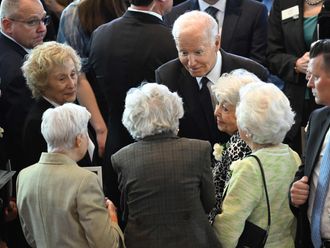Cairo: US President George W. Bush is singled out for vehement blame in Egypt's biggest ever film production.
Lailyat Al Baby Doll (Baby Doll Night), a £E40 million (Dh13.8 million) political comedy, has just hit local screens, generating big attention from the audience and critics alike.
The film, packed with Egyptian and Syrian stars, tells the story of Hussam, an Egyptian living in the US, who is eagerly preparing to return home for a reunion with his wife after a long absence.
With the New Year just around the corner, Hussam (played by veteran Egyptian actor Mahmoud Abdul Aziz) wants to celebrate New Year's Eve with his spouse in Cairo. He buys her a baby doll. But his plans go awry due to a series of events that thrust him into a terror plot.
Based on a screen play penned by late Egyptian scriptwriter Abdul Hai Adeeb, the film is directed by his son Adel.
Baby Doll Night was shown at the commercial section of the Cannes Film Festival last month.
"The film is spectacular," said Ahmad Hassan, a commerce student, as he left a fashionable theatre in Cairo. "It has a cast of around 15 big-name actors, who look as if they were in a competition on the screen," he added.
Baby Doll Night is produced by Good News, a company credited with making Egypt's big-budget blockbuster The Yacoubian Building.
"I think Baby Doll Night has breathtaking camera work and a captivating score. But the film itself suffers from the perennial defects of Egyptian cinema," said Esmat Hamdi, a movie critic.
"The film has an unclear plot full of flashbacks, unexplained coincidences and long rhetorical speeches about politics," Hamdi told Gulf News.
He added that makers of the film had "good intentions" to present a good political comedy. "But good intentions and lavish production are not enough to create a well-remembered film about such issues, which have global dimensions."
The detainees' abuse by US military personnel in the notorious Abu Ghraib prison near Baghdad are revisited in the film through Awadin Al Assiuti, a TV reporter-turned-terrorist, out to take revenge on the Americans who tortured him in jail, leaving him sexually impotent.
The movie constantly moves from the comic to the political with flashbacks from the US, Palestine, Iraq and Holocaust scenes in Germany.
"The Holocaust scenes in particular have no justification in the plot," said movie critic Tarek Al Shenawi. "I think the director wanted to woo the Jews and give his film an international semblance."
Adel Adeeb, who directed Baby Doll Night, was quoted in the local media as denying that the Holocaust scenes were arbitrarily put into his film. "This film talks about our world and tackles conflicts in the Middle East," he argued.
"It features different, balanced views. By referring to Hitler's atrocities against the Jews and highlighting the Palestinians' plight under the Israeli occupation, the question is if there is a difference between what happened in the past and what is happening today in Palestine."












